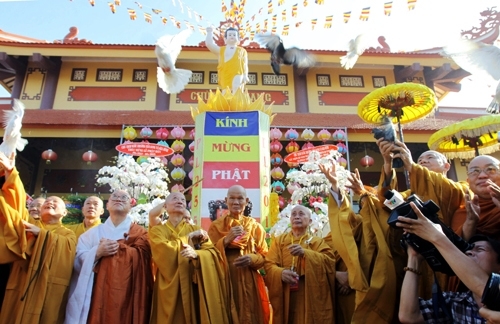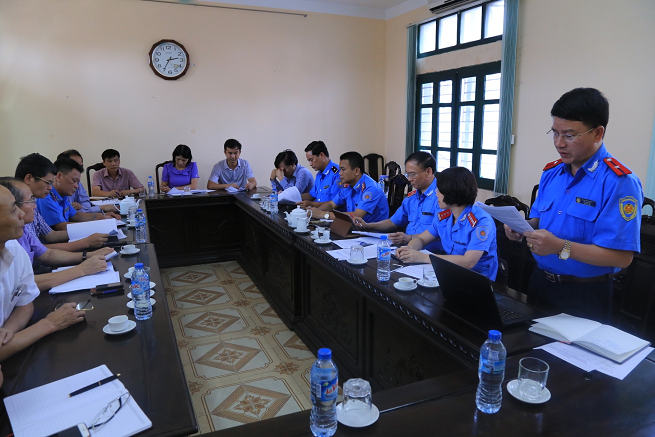Law amending certain provisions of the Law on Officials and the Law on Public Employees has been passed and officially took effect from July 01, 2020. There will be many new policies directly impacting all officials and public employees in Vietnam from the year 2020.
1. Three Cases eligible to be considered "Lifetime Public Employee" in Vietnam from July 1, 2020
Law on Cadres, Officials and Amended Law on Public Employees 2019 has amended and supplemented an important content in Article 25 of the Law on Public Employees 2010. Specifically, this law stipulates that fixed-term employment contracts are those in which both parties determine the term and the time of termination of the contract within the period from 12 months to 60 months (instead of from 12 months to 36 months). The most notable aspect is that this contract applies to those recruited as public employees from July 1, 2020, except for the cases specified at point b and point c, clause 2 of this Article.
This means that from July 1, 2020, there will no longer be cases where public employees who complete a fixed-term employment contract are automatically transferred to indefinite-term contracts. Instead, public employees must sign fixed-term contracts, and all cases of public employees who have not implemented indefinite-term contracts must sign fixed-term contracts.
However, public employees after finishing their fixed-term contracts will be eligible to sign indefinite-term contracts if they fall into one of the following three cases:
- Public employees recruited before July 1, 2020;- Cadres, officials transferred to public employees according to the provisions at point b, clause 1, Article 58 of the Law on Public Employees 2010 (i.e., public employees who are accepted and appointed to the positions prescribed by law as officials, the decision to accept and appoint simultaneously serves as the recruitment decision);- Those recruited as public employees to work in areas with exceptionally difficult socio-economic conditions.
2. Official removal of policies on officials in Public Service Providers in Vietnam
To be specific, according to the provisions in Clause 1, Article 1 of the Law on Cadres, Officials, and Public Employees 2019, which amends and supplements Clause 2, Article 4 of the Law on Officials 2008 regarding the definition of officials, an official is a Vietnamese citizen, who is recruited, appointed to a rank, position, or title corresponding to the position in the Communist Party of Vietnam, the State politic, and socio-political organizations at central, provincial, and district levels; in agencies and units belonging to the People's Army but not as officers or career soldiers or defense workers; in agencies and units belonging to the People's Police but not as officers, non-commissioned officers serving under professional policies, or police workers, on the payroll and receiving salaries from the state budget.
It is clear that, compared to the current regulations in the Law on Officials 2008, the Amended Law has excluded those in the leadership and management apparatus of public service providers of the Communist Party of Vietnam, the State, and socio-political organizations from the definition of officials.
Thus, from July 1, 2020, when this Law comes into effect, there will no longer be official policies in public service providers as at present.
3. Additional Forms for grade promotion for Officials
To be specific, according to the provisions of Clause 8, Article 1 of the Law on Cadres, Officials, and Public Employees 2019 which amends and supplements Article 44 of the Law on Officials 2008, rank promotion for officials must be based on job position, suitable to the rank structure of the agency, organization, or unit, and is carried out through exams or consideration for promotion.
Thus, the Amended Law has added a form of consideration for promotion alongside the existing form of promotion exams compared to the current regulations in the Law on Officials 2008.
4. To lossen up the Retirement Conditions for Public Employees in Vietnam from July 1, 2020
To be specific, according to Clause 8, Article 2 of this Law which amends and supplements Clause 3, Article 56 of the Law on Public Employees 2010, public employees who are under disciplinary action, being investigated, prosecuted, or on trial cannot be appointed, seconded, trained, or resigned. This means that disciplinary policies on retirement will still be applied to public employees under disciplinary treatment (according to the current regulation, retirement will not be resolved for these subjects). Thus, it can be seen that the Amended Law has relaxed the conditions for resolving retirement for public employees compared to the current provisions in the Law on Public Employees 2010.

Illustrative Image
5. Officials can still be disciplined even after they resign or retire
According to Clause 18, Article 1 of the Law on Cadres, Officials, and Public Employees 2019 which amends and supplements Article 84 of the Law on Officials 2008, any violations committed during their tenure by officials who have quit or retired will be dealt with according to the law. Depending on the nature and severity, the violators can be subject to criminal, administrative, or disciplinary actions. Cadres and officials who upon retirement or resignation are later found to have committed violations during their tenure shall be subject to one of the disciplinary actions, including reprimand, warning, or stripping of position titles they previously held, along with relevant legal consequences.
Thus, starting from July 1, 2020, officials, even in retirement, if found to have committed prior violations, will still be subject to the above-mentioned three disciplinary actions.
6. Changes in Regulations on Resignation Policies for Public Employees in Vietnam
To be specific, according to Clause 6, Article 2 of the Law on Cadres, Officials, and Public Employees 2019 which amends and supplements Clause 1, Article 45 of the Law on Public Employees 2010, public employees shall be entitled to resignation allowance, job loss allowance, or unemployment insurance benefits in accordance with labor laws and social insurance laws when the public service provider unilaterally terminates the employment contract, or when the term of the contract has expired but the employer does not renew it, or when the public employee unilaterally terminates the contract due to illness or accident as stipulated in clause 4, Article 29 of the Law on Public Employees 2010 or unilaterally terminates the contract under clause 5, Article 29 of the Law on Public Employees 2010, except in the following cases:
- Being dismissed;- Unilaterally terminating the employment contract while violating provisions of clauses 4, 5, and 6 of Article 29 of the Law on Public Employees 2010;- Terminating the employment contract as defined at clause 5, Article 28 of the Law on Public Employees 2010.
Thus, this Law has clearly stipulated resignation policies for public employees upon unilateral termination of the employment contract by the public service provider instead of a general provision on policies for public employees upon termination of employment contracts as currently provided.
7. Additional Case for Termination of Employment Contracts for Public Employees from July 1, 2020
The Law on Cadres, Officials, and Public Employees 2019 has added a case where public service providers can unilaterally terminate the employment contract with public employees, which is: “Public employees who do not meet requirements after the probationary period.”
Currently, this provision is mentioned in Decree 29/2012/ND-CP regarding the termination of employment contracts for probationary employees, but it has not been officially regulated in the Law.
Thus, from July 1, 2020, there will be six cases where public employees will have their employment contracts terminated.
8. No Statute of Limitations for Disciplinary Actions Against Officials in Certain Cases
According to the provisions of Clause 1, Article 80 of the Law on Officials 2008, the statute of limitations for disciplinary actions against officials is set at 24 months from the time of the violation occurrence. However, the Law on Cadres, Officials, and Public Employees 2019 increased this statute of limitations to a maximum of 60 months from the time of the violation.
Moreover, according to this Law, the statute of limitations for disciplinary actions will not apply to officials who commit one of the following violations:
- Party members who commit violations subject to expulsion;- Violations regarding internal political affairs;- Violations infringing on national interests in the fields of defense, security, or foreign affairs;- Using fake or illegal diplomas, certificates, or confirmations.
Thus, officials will not be subjected to the statute of limitations for disciplinary actions and will be considered for disciplinary actions at any time if they are found to have committed one of the aforementioned violations.
9. Additional Policies for Talented Officials
To be specific, according to Clause 2, Article 1 of the Law on Cadres, Officials, and Public Employees 2019, which amends and supplements Article 6 of the Law on Officials 2008, the State shall have policies to discover, attract, nurture, respect, and appropriately treat talented individuals.
Starting from 2020, the Government of Vietnam will prescribe the framework for policies of utilization and preferential treatment for talented individuals in civil service activities.
Based on the Government's regulations, heads of agencies managing officials will regulate policies for utilizing and treating talented individuals in civil service activities applicable within their managing scope.
Thus, starting from July 1, 2020, there will be more specific regulations and policies on utilizing and treating talented officials.
10. Additional Two Cases for Official Recruitment Without going through Examination
To be specific, according to Clause 5, Article 1 of the Law on Cadres, Officials, and Public Employees 2019, which amends and supplements Article 37 of the Law on Officials 2008, the recruitment of officials through consideration is carried out in the following cases:
a) Committing to volunteer work for 5 years or more in areas with exceptionally difficult socio-economic conditions;
b) Students under the admission by form of nomination according to the provisions of the Law on Education, after graduation, returning to work at the local place where they were sent;
c) Excellent graduates, talented young scientists.
Thus, starting from July 1, 2020, there will be two additional cases where officials are recruited through consideration including those studying under the admission by form of nomination and returning to work at their local place after graduation, and excellent graduates, talented young scientists.
Toan Trung
- Key word:
- public employee
- official
- Vietnam
- policy
 Article table of contents
Article table of contents
![[InfoGraphic] 6 forms of discipline for officials and public employees under Decree 71/2016/ND-CP](https://cdn.lawnet.vn//uploads/NewsThumbnail/2016/07/12/1319291-01.png)









.Medium.png)
.Medium.png)
.Medium.png)
.Medium.png)
